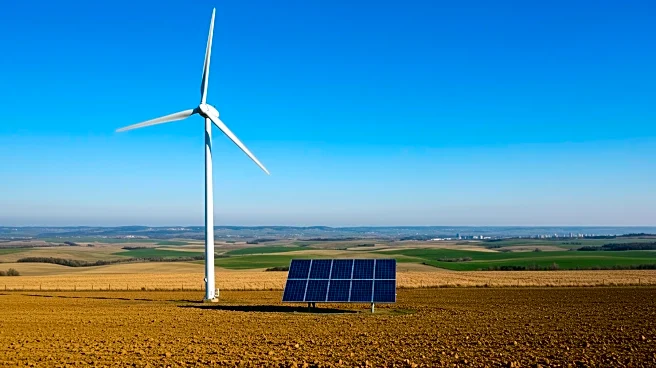What is the story about?
What's Happening?
The Trump administration has introduced new rules through the Internal Revenue Service (IRS) that make it more challenging for wind and solar energy projects to qualify for federal tax credits. The new guidelines require significant physical work to have commenced by July 2026 for projects to be eligible. This move is part of a broader effort to clamp down on subsidies for renewable energy, following a deal to secure President Trump's legislative agenda. The IRS has redefined the criteria for starting construction, shifting from a 5 percent investment threshold to a requirement for 'physical work of a significant nature.' While major solar and wind projects are affected, smaller residential solar installations may still qualify under previous rules, providing a slight reprieve for homeowners and small businesses.
Why It's Important?
The changes in tax credit eligibility could have significant implications for the U.S. renewable energy sector, potentially slowing down the growth of solar and wind projects. Industry representatives express concern that these restrictions are part of a broader strategy to undermine clean energy initiatives, which could lead to reduced investment and development in the sector. The new rules may force renewable energy projects to compete more directly in the market without government support, impacting companies that rely on these credits for financial viability. The decision could also lead to legal challenges, as stakeholders argue that the administration's actions exceed legislative intent.
What's Next?
The renewable energy industry is likely to face increased uncertainty and potential legal battles over the new IRS rules. Companies may need to reassess their project timelines and investment strategies in light of the accelerated phaseout of tax credits. The industry could see a shift towards smaller, distributed solar projects that still qualify under the previous criteria. Additionally, the broader implications of these changes may prompt further debate and advocacy efforts from environmental groups and industry associations seeking to protect clean energy initiatives.
Beyond the Headlines
The decision to limit tax credits for renewable energy projects highlights ongoing tensions between the Trump administration and clean energy advocates. It underscores the administration's preference for traditional energy sources and its skepticism towards government intervention in the renewable sector. This development may also influence public perception and policy discussions around the role of government in supporting sustainable energy solutions, potentially affecting future legislative efforts in this area.
















